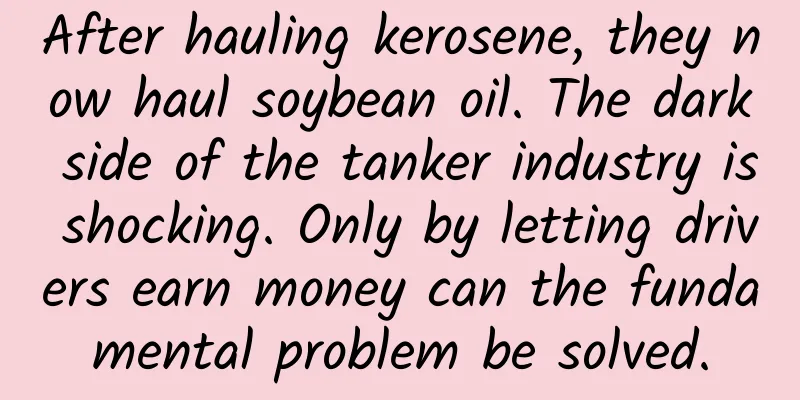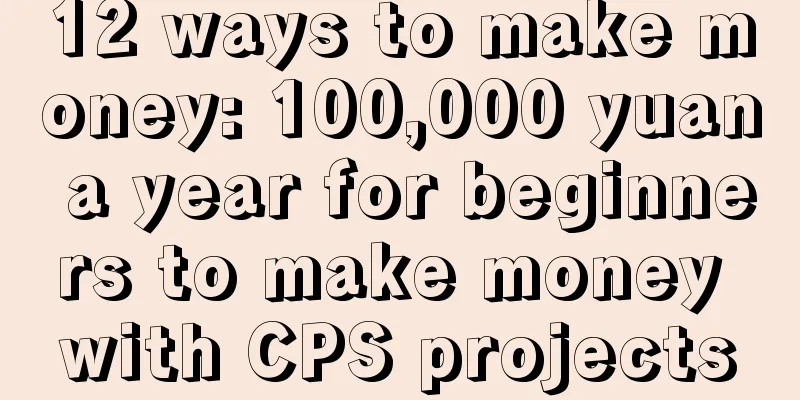After hauling kerosene, they now haul soybean oil. The dark side of the tanker industry is shocking. Only by letting drivers earn money can the fundamental problem be solved.

|
Isn’t it a bit outrageous that a tanker truck that has just finished transporting coal-to-liquid oil directly fills the tank with cooking oil without even cleaning it and heads to the next destination? Yet this is what actually happened. On May 21, a tanker truck entered a grain and oil company in Yanjiao, Hebei Province, and then drove out of the factory after being loaded with more than 30 tons of soybean oil. This tanker truck had just finished transporting coal-to-oil three days ago, and after unloading, it did not clean the storage tank but directly loaded it with edible soybean oil. Coal-to-oil and edible oil, one is for industrial use and the other is for food. If the tanks are not cleaned, it is equivalent to mixing them, and the contaminated soybean oil will then end up on the consumers' tables. Experts say that the residues from coal-to-oil contain harmful components such as saturated hydrocarbons, aromatic hydrocarbons, sulfides, etc., which can cause poisoning to consumers. After the incident broke out, many people linked it to the question of "Is the oil I eat safe?" However, it should be noted that this incident cannot be interpreted as "Chinese edible oil is of poor quality" because the problem lies in the transportation link, not the production link. In other words, if the edible oil you eat is transported by special tankers and there is no "mixed loading" link as exposed this time, there will be no problem with the quality. According to the "Bulk Transportation Specifications for Edible Vegetable Oil" implemented in my country in 2014, special containers should be used to transport edible oil. When filling the transport containers with oil, independent or dedicated oil pipelines should be used, and different grades of oils cannot be mixed. Although the "Specification" is not a mandatory national standard and is only "recommended", well-known large grain and oil companies in the industry have established "dedicated" tanker fleets in accordance with this standard, and large distributors will also establish their own fleets. Leading companies such as Golden Dragon Fish and COFCO have basically achieved the integration of docks, warehousing, pressing, sub-packaging and other links, and there is not much demand for long-distance tanker transportation of edible oil. So, where exactly is the problem? It’s mainly small and medium-sized distributors and some third-party transport fleets, and there are two reasons for this:
Running an empty truck will result in a waste of transport capacity, which is also known as "idling", so the driver must try to improve the efficiency of the vehicle. In this case, the driver will inevitably be more inclined to "take the job when there is one", which leads to the situation where after transporting coal-to-oil, the next step is to transport edible oil. In addition, transportation companies are also divided into different business models. Many transportation orders are subcontracted among different operators. After several changes of hands, the final carrier has no responsibility for upstream and downstream companies, and naturally will not pay attention to food safety issues. Even if the sky falls, he will only take care of transportation. The tank truck that was exposed this time had just transported coal-to-liquid from Ningxia to Qinhuangdao. The distance between the two places is more than 1,300 kilometers. If it is used exclusively for this purpose, it will return empty and the transportation company will suffer losses. So we can see that this public opinion fermented for two days, but the problem of poor edible oil quality did not come out. The reason is here. It is not the oil product that has a problem, but the transportation link is not standardized. The companies involved in the incident exposed by the media are all small-scale bulk oil sales companies, and this type of company is often unable to set up a dedicated edible oil transportation fleet. Now let us unravel the mystery, look at the whole thing from a different perspective, and find out where the source lies. Let me give you a conclusion here. The root cause of the whole thing is that the transportation costs are too low and the drivers earn very little, while the cost of building a dedicated fleet is too high, resulting in the operators being unable or unwilling to bear the cost of "dedicated vehicles for dedicated purposes". In fact, this problem has long been exposed. The latest news yesterday was that Hunan TV had exposed such an incident 17 years ago. However, even though the problem is so clear, it is not a simple operation to solve it because the interest chain is too complicated. If drivers' salaries are improved and industry regulations are strengthened, everything will be solved. However, the simpler and clearer the problem is, the more complicated it is to solve, and there is no way to find a solution - who will pay for the improvement of drivers' salaries? In fact, the repeated overloading of large trucks, overage of large buses, and the "mixed loading" of muck trucks at night are all due to the low income of drivers. The drivers are paid low wages, so they have to develop their bodies to the extreme, work harder, and rush to get more time and orders, which leads to problems of one kind or another. It is a well-known fact that truck drivers have a hard life. In order to make more money, many drivers set up their "home" on the truck, eating and sleeping in the small cab, and couples take turns driving day and night without rest. In fact, in the early years, driving a large truck was profitable. It was common for a family to live in the county with a small light truck, and it was also a hot topic for discussion among aunties and grandmas in the fields. At that time, drivers were motivated and had dreams. Their wheels carried the hopes of the entire family. But now, vehicles are getting bigger and bigger, wheels are increasing, but the operating income is getting less and less, so that the whole life has to be tied to the steering wheel. There is certainly a problem with truck drivers mixing fuel products, but if the reality of low wages cannot be changed, this phenomenon will not be eliminated at the root and will only get worse. In fact, every one of us consumers has a responsibility to put coal-to-oil into our mouths. From the perspective of the economic transmission chain, when we consumers start pursuing the purchase of two rolls of toilet paper for one cent and look for opportunities to get a refund, the seeds of this outcome have actually been sown. When all participants in the entire economic chain start to play with excessively low prices and fight for internal competition, when an avalanche occurs, naturally no snowflake will be innocent. Recently, new energy vehicles have frequently launched price wars, which have been criticized by many people. Many suppliers said that price wars are not the end, and consumers will be the ultimate victims. Bosch President Xu Daquan pointed out that they will not sacrifice profits for market share, because only by maintaining a virtuous cycle can they continue to invest in new technologies and support the long-term development of enterprises. Dr. Xu's words are very euphemistic. This is the reality. Large manufacturers have the strength to eliminate the weak through competition, but small and medium-sized manufacturers cannot afford it, but they have to follow suit and cut prices. In order to ensure their survival, they will cut corners to reduce costs "invisibly", which ultimately causes various tragic incidents for consumers. For any industry, simply increasing the volume of revenue is not the end point. The end point is to allow all practitioners to earn money through their own labor. Back to the issue of tanker trucks, the fundamental solution to this problem is how to make the entire transportation chain earn money. If drivers are to be willing to comply with the "special car for special use" rule, their income level must be guaranteed. Too low freight rates will only breed various problems. Of course, in addition to this, we must also promote the improvement and implementation of relevant laws and regulations. The reason why many drivers and transportation companies dare to "mix" is because the "Bulk Transportation Specifications for Edible Vegetable Oils" implemented in 2014 is "recommended" rather than a mandatory standard. Our relevant departments should promote legislation as soon as possible to upgrade this "Specification" to a mandatory standard, encourage true dedicated car use, and improve drivers' remuneration to form a virtuous circle. This will also eliminate some transportation companies and drivers that do not meet the requirements and ultimately form real industry norms. Only when I have a real talent can I understand etiquette. The ancients were not deceiving me. As a winner of Toutiao's Qingyun Plan and Baijiahao's Bai+ Plan, the 2019 Baidu Digital Author of the Year, the Baijiahao's Most Popular Author in the Technology Field, the 2019 Sogou Technology and Culture Author, and the 2021 Baijiahao Quarterly Influential Creator, he has won many awards, including the 2013 Sohu Best Industry Media Person, the 2015 China New Media Entrepreneurship Competition Beijing Third Place, the 2015 Guangmang Experience Award, the 2015 China New Media Entrepreneurship Competition Finals Third Place, and the 2018 Baidu Dynamic Annual Powerful Celebrity. |
>>: Microsoft foldable Bluetooth keyboard review: 5mm ultra-thin and feels good
Recommend
Segment your users and how to conquer them one by one?
Today, we will talk about practical techniques fo...
Goggles for birds? Scientists too full?
In nature, no birds wear goggles. They do not nee...
Mercedes-Benz to invest 40 billion euros in the next eight years to build eight battery cell factories to accelerate electrification transformation
At present, many countries and regions around the...
Rocky Mountain Institute: China's chemical industry's zero-carbon path under the goal of carbon neutrality
The chemical industry is broadly defined as the p...
Attention, tourists! Our next stop is Lung Lobe!
These four tips to increase your lung capacity: I...
Keep the moral bottom line: 15 kinds of "rogue" methods of APP promotion
Rogue promotion methods are methods that some man...
Good news for debugging database in mobile phone: Android-Debug-Database
Currently, debugging apps in the browser is becom...
Alpha Egg Smart Dictionary Pen S Review: Connect to Huawei's smart ecosystem to create the best learning experience
In our primary and secondary school years, dictio...
Don't laugh! Shanxi people really eat dirt
Double 11 has just passed and Double 12 is coming...
How to choose the type of large website server rental?
At present, more and more people are starting to ...
iOS 17 hands-on experience, several new features are pretty good, upgrade methods are included!
Yesterday morning, Apple finally released the iOS...
Tearful Dog Head: Will they cry with joy when they are reunited with their owners?
In May this year, a Bichon Frise named "Coff...
Yuanfudao Product Analysis
How did Yuanfudao, which has only been establishe...
Feixue Wuqing "22 Lectures to Master the Go Language" - Go Language Evangelist's Introductory Notes
Introduction to the training course content: Go ha...
“Meituan Takeout” product analysis report!
Take-out has become a must-have for urbanites, sa...









